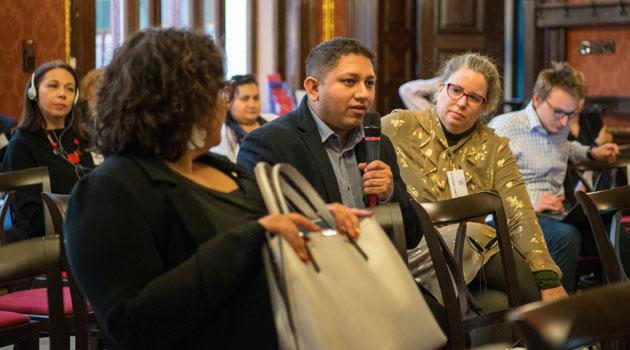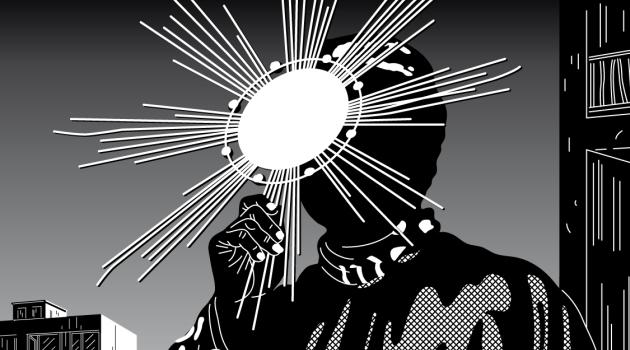His friends know him by his nickname, “Mižu”. MICHAL MIŽIGÁR originally wanted to become a cook, but his life has turned out differently: the 27-year-old graduate of Charles University in Prague today speaks several foreign languages and is studying history in Budapest.
Michal loves working with children and doing his best to show them what they can achieve in life if they want to. He can be seen working with the famous singer Ida Kelarová and her children’s choir, Čhavorenge.
He has successfully completed both high school and university, has a passion for linguistics, has given countless lectures about Romani culture, and has worked at the Embassy of the USA to the Czech Republic. None of this would be very remarkable save for the fact that Michal is hearing impaired.
His hearing difficulties, due to which many things are harder for him than they are for others, probably need never have arisen. According to him, when his mother took him for his regular vaccinations to the local doctor as a little boy, she warned the doctor that he was ill with fever at the time.
The pediatrician injected Michal with the vaccinations nonetheless and assured his mother that nothing would go wrong. Unfortunately, it was the doctor who was wrong: Michal began to lose his hearing.
What’s more, according to Michal, the doctor later altered his vaccination records to make it seem as if Michal had not been vaccinated on that day and that the vaccination had been recorded incorrectly. From an early age, Michal compensated for his fading hearing by observing situations around him, and nobody in his family understood at first that he even had a hearing problem.
His disability was not discovered until he went to preschool and a teacher noticed that Michal was not reacting when she spoke to him. When he was supposed to enroll into first grade, the mainstream school did not want to accept him and told his mother that he should attend “special school”.
Michal’s mother resolutely refused to enroll him into such education. “It was difficult. Mom went from school to school, but the label of ‘deaf Rom’ was stronger than she was. It was not until August, just before the school year was to begin, that she managed to enroll me into one of the best primary schools in Písek,” he told Romano vod’i magazine.
Until the sixth grade Michal was able to function in primary school without any problems, but then he had to transfer because the school was closed. The new collective of students “rubbed it in” that he was hearing impaired and Romani – he was confronted with negative reactions daily.
Michal decided that he would combat the bullying and racism he was experiencing in any way possible except through violence. He began to give presentations to his fellow pupils and teachers about Romani culture and traditions, began to take a greater interest in Romani history himself, and began to write articles about Romani customs for the school magazine.
His uncle, Mr Matěj Sarközy, was a great support to him and initiated him into many matters. Without suspecting that Romani Studies even existed, Michal began collecting Romani fairy tales and other texts, kept statistics on Romani words, and followed the differences among the different dialects of Romanes he heard around him.
Michal contributed articles to local newspapers and successfully participated in the competition for the Milena Hübschmannová Literary Award run by the ROMEA organization. He speaks Czech, English and Slovak, can also get by in German, and has mastered the basics of Hungarian, Polish, Romanian, Serbian and the Vlax variety of Romanes.
From the kitchen to the academy
Michal attended a student club as a child, and one day he mentioned in front of an assistant there that he would not be going to business academy, as had been anticipated, but would study to be a sous-chef. The manager of the club intervened and played a similarly tenacious role in Michal’s life as his mother had at the beginning of his school career – he decided to aid Michal with preparing for the entrance examinations and to not allow him to give up his dream of attending a high school with an exit examination.
What’s more, Michal got an “ultimatum” from his family: If he did not make it into the academy, he would have to train to become a chef. His family was also afraid for him and did not want him to travel to another city to live at a boarding school.
The months of hard work and tutoring to which he dedicated his holidays paid off, and Michal passed the entrance examinations. During his studies he organized a successful exhibition about Roma for the celebration of International Romani Day on 8 April.
“During that year I met many people. Thanks to that, the exhibition turned out better than I had anticipated. We exhibited the photographs of Eva Davidová, the University of South Bohemia and the Museum of Romani Culture collaborated with us, and the entire thing was a great success,” Michal recalled of those days.
Among those whom Michal met was the singer Ida Kelarová, and he attended his first-ever summer camp with her children’s choir. He then chose to do a degree in Romani Studies at Charles University in Prague.
“This was somehow predestined for me. I am of the opinion that if a Romani person wants to learn something about Romani history, he or she must go to college, because it is impossible to study this through the resources commonly available,” he told Romano vod’i.
While at university he began to get involved with different nonprofit projects and became a “full-time activist”. After graduation he was an intern at the American Embassy as a consultant to the cultural and political department.
Michal was responsible for the embassy’s contact with Romani people, attended various meetings, and accompanied the Ambassador on visits to excluded localities. “It was there that I realized how much Romani Studies and my education had aided me in this area. I was able, thanks to my training, to give expert answers to different inquiries and to express my opinion of the subject matter related to Romani people,” he told Romano vod’i.
After his experience at the embassy he worked as a project assistant for the Open Society Foundation Prague. As of 2009 he has primarily dedicated himself to the children in the Čhavorenge choir.
“Ida is a person who makes you face the biggest challenges. Thanks to her I began to lecture around Europe about Romani people – and thanks to that I also learned English,” he told Romano vod’i.
So Romani history will not be lost
After some time Michal decided he had had enough of activism and projects and he returned to his biggest original aim: Lecturing and teaching about Romani history. Currently he is continuing his studies at Central European University in Budapest in a program for Romani people who, after completing their Bachelor’s degrees, are preparing for their Master’s.
Michal was the only student from the Czech Republic to successfully apply to this CEU program. “The beginning was very difficult for me and my English was rather poor. I got almost no sleep, I didn’t eat properly, but ultimately I dealt with it all. There are people from more than 30 different countries here. It is important for me to be in a place where I am not the only person who is ‘different’, to encounter people from other cultures,” he said.
He plans to remain in Budapest and would like to study history further to contribute, as an academic, to Romani history not being lost from memory and for the history of the Holocaust of the Roma not to be distorted. “I would also like to contribute to more successful young Roma becoming aware of their Romani identity. Among us there are many who are successful, but frequently they are ashamed that they are Romani. They do not know their own history, they do not see anything good in their own ethnicity – and I would like to change that. I see it as my mission,” he explained to Romano vod’i.
Just like many other successful young Romani people, Michal is aware that his work has a cost, namely, living far away from his loved ones. “I love my family, however, I cannot be with them as often as I would like. I have practically no private life, I dedicate all of my free time to my studies and work. I am aware that this is the tax for wanting to achieve my aims and change people’s lives,” he said.

